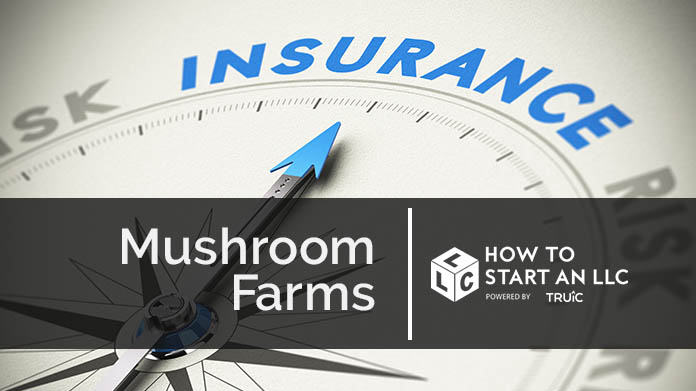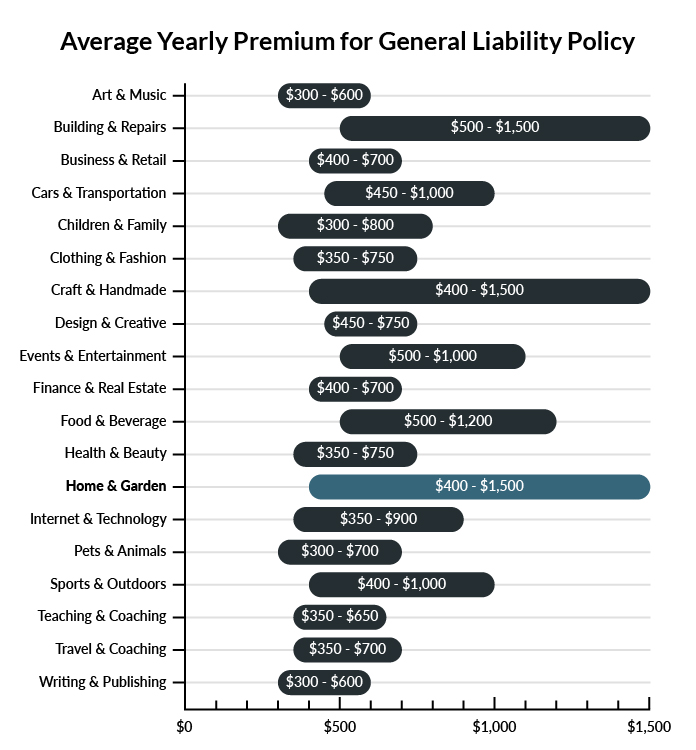Mushroom Farm Business Insurance
Getting insurance for your mushroom farm business is essential.
This is because you will need to protect your business’s assets against a variety of different risks, such as those that relate to food-poisoning allegations, land law disputes, and employee injuries.
Business insurance can also be used to cover the cost of repairing and/or replacing broken or stolen farm equipment.
We’ll help you find the most personalized and affordable coverage for your unique business.

Recommended: Ergo Next Insurance is dedicated to matching small businesses with the right policy at the best price.
Best Insurance for a Mushroom Farm Business
General liability insurance is — generally speaking — one of the most important insurance policies for mushroom farm businesses.
Some of the risks general liability insurance covers are:
- Bodily injury
- Property damage
- Medical payments
- Legal defense and judgment
- Personal and advertising injury
Having said that, it is important to understand that you will likely benefit from purchasing additional coverage.
This is because a general liability insurance policy will not be able to protect your mushroom farm business from all foreseeable risks, such as those that relate to:
- Food poisoning allegations: Covered via a product liability insurance policy.
- Trademark disputes over mushroom-related packaging: Covered via an intellectual property insurance policy.
- Employment law-related disputes: Covered via a workers’ compensation insurance policy.
- Lost income due to fire or wind damage: Covered via a business interruption insurance policy.
You will also need to pick the right type of business insurer for your mushroom farm business.
As of 2026, there are two general types of providers available:
- Online insurance providers (recommended): Popular choices include Ergo Next Insurance and Tivly.
- Brick-and-mortar insurance providers: Popular choices include CNA and Hiscox.
Let’s Find the Coverage You Need
The best insurers design exactly the coverage you need at the most affordable price.
Cost of General Liability Insurance
The average mushroom farm in America spends between $350-$900 per year for $1 million in general liability coverage.
Compare the average cost of general liability insurance for a mushroom farm business to other professional industries using the graph below.
Several factors will determine the price of your policy. These include your:
- Location
- Deductible
- Number of employees
- Per-occurrence limit
- General aggregate limit
You may be able to acquire general liability insurance at a discounted rate by purchasing it as part of a business owner’s policy (BOP) rather than as a standalone policy.
A BOP is a more comprehensive solution that includes multiple forms of coverage, such as business interruption and property insurance.

Find the Best Rate
Discover the best coverage at the lowest rate in our affordable business insurance review.
Common Situations That General Liability Insurance May Cover for a Mushroom Farm Business
Example 1: While touring a farm, a visitor trips over-irrigation equipment and bumps their head in the fall. General liability insurance would probably cover the cost of treating any resulting injuries.
Example 2: An employee makes a false claim about a mushroom’s healing powers on social media, and a follower files a false advertising lawsuit. General liability insurance would probably cover the cost of the suit.
Example 3: While delivering mushrooms to a gourmet grocery store, an employee accidentally knocks over a large display cooler of truffles. The glass window on the cooler is shattered, and the truffles are rendered inedible. General liability insurance would likely cover the cost of the property damage incurred.
Other Types of Coverage Mushroom Farm Businesses Need
While general liability is the most important type of insurance to have, there are several other forms of coverage you should be aware of. Below are some of the most common types of coverage:
Commercial Property Insurance
Mushroom farms typically need commercial property insurance for their buildings and equipment. Property insurance can also cover supplies and product inventory.
When selecting a commercial property policy for your mushroom farm, make sure the policy covers your farm’s buildings as well as any growing equipment and supplies you have. A robust policy should also cover grown mushrooms since they’re considered inventory.
Commercial property insurance is widely available through a business owner’s policies (BOPs).
Product Liability Insurance
Businesses can sometimes be held financially responsible for any injuries that their products cause. Product liability insurance helps protect businesses from product-related lawsuits in the event that their products cause harm.
Since mushrooms are products, mushroom farms can get product liability insurance for them. Should a mushroom ever cause someone to choke or a batch of mushrooms make multiple people sick, having this coverage could help protect your farm from the financial fallout.
Product liability insurance is normally purchased by itself or within a package policy.
Workers’ Compensation Insurance
If your mushroom farm has employees, the business needs to carry workers’ compensation insurance. This insurance covers job-related illnesses and injuries, and most states require employers to carry it.
Commercial Auto Insurance
Commercial auto insurance is used to insure vehicles that are used for business purposes. Your mushroom farm needs this coverage if the business owns a delivery truck or van, and you might still need this coverage if you use a personal vehicle to make deliveries. Personal auto insurance policies generally won’t cover business driving.
Commercial auto insurance may be purchased by itself or as part of a package policy.
Additional Steps To Protect Your Business
Although it’s easy (and essential) to invest in business insurance, it shouldn’t be your only defense.
Here are several things you can do to better protect your mushroom farm business:
- Use legally robust contracts and other business documents. (We offer free templates for some of the most common legal forms.)
- Set up an LLC or corporation to protect your personal assets. (Visit our step-by-step guides to learn how to form an LLC or corporation in your state.)
- Stay up to date with business licensing.
- Maintain your corporate veil.
Mushroom Farm Business Insurance FAQ
Yes, absolutely. You will need to first get a quote from an online business insurance provider like Ergo Next Insurance. Ergo Next allows you to then purchase a policy immediately and your coverage will be active within 48 hours.
A typical business owner’s policy includes general liability, business interruption, and commercial property insurance. However, BOPs are often customizable, so your agent may recommend adding professional liability, commercial auto, or other types of coverage to your package depending on your company’s needs.
“Business insurance” is a generic term used to describe many different types of coverage a business may need. General liability insurance, on the other hand, is a specific type of coverage that business owners need to protect their assets.
Yes, you should get insurance as soon as possible. This will help ensure that your business’s assets (e.g., purchased land, inventory, farm equipment, etc.) are protected before any liability arises.
For a mushroom farm, business insurance can protect you against a contractual dispute with a commercial landlord, a product liability claim, or an employment law violation.
Not necessarily. Certain exceptions may be written directly into your mushroom farm business insurance policy, and some perils may be entirely uninsurable.
Yes, an LLC is meant to create a legal barrier between your business and your personal assets and credit. If you haven’t formed an LLC yet, use our Form an LLC guide to get started.
An LLC doesn’t protect your business assets from lawsuits and liability– that’s where business insurance comes in. Business insurance helps protect your business from liability and risk.